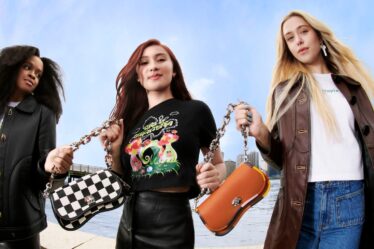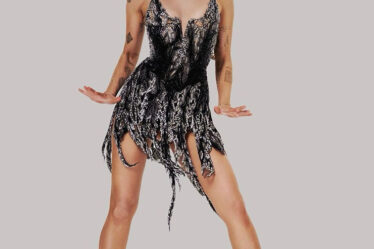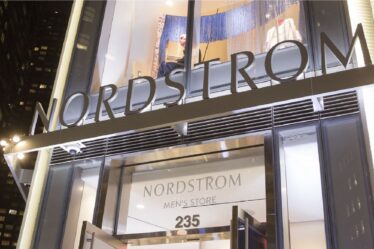It’s not easy to play it cool when your brand gets a surprise shoutout on a Beyoncé track.
Lucchese, the 141-year-old, Dallas-based western boot brand, is name-checked by Nigerian-American musician Shaboozey on Beyoncé’s “Sweet Honey Buckiin,’” where he raps “Lucchese the boots, check / you can hear when I step, step.”
“We’re delighted and humbled,” said Austin Ripmaster, Lucchese’s vice president of brand communications and the creative suite, before adding “we’re just as excited if Beyoncé wears it as we would be if you were to wear it.”
Of course, this isn’t Lucchese’s first pop culture rodeo. Well before Cowboy Carter, western wear was having a moment. Brands specialising in boots, hats and denim have been riding an Americana wave for at least five years now, driven by Paramount’s smash hit neo-western drama Yellowstone, Coachella, TikTok’s “coastal cowgirl” trend and more. Even Barbie and Ken opted for cowboy hats and fringe when they jumped into the real world and needed new outfits.
Ripmaster’s modest pose is all about ensuring western wear is no fleeting “-core” trend. Mission accomplished, so far: for a style of dressing that, not all that long ago, was rarely seen outside of a rodeo or Ralph Lauren photo spread — unless if you didn’t live in Texas — boots, fringe, denim and cowboy hats are proving to have wide appeal. Boot maker Tecovas saw its revenues grow 24 percent last year, surpassing $200 million. It plans to open its first store outside the Sun Belt, in Pennsylvania, later this year. Shares of Boot Barn, a nationwide chain, have more than tripled since 2019. Mainstream brands, high and low, now routinely draw on western tropes, whether it’s Pharrell William’s autumn/winter 2024 menswear collection for Louis Vuitton, or the hundreds of cowboy boots sold by Shein.
In that sense, Beyoncé, clad in a red, white, and blue Rodeo-inspired outfit, white Paris Texas boots and crisp cowboy hat sitting atop a horse on the album’s cover, is late to the party. But her gigantic audience — one that’s far more diverse than your typical country star’s, or Yellowstone’s — could make Cowboy Carter another watershed moment for the western trend.
Over the weekend, DJs Arty Furtado and Miss Milan hosted a listening party at a queer nightclub in Bushwick, a neighbourhood in Brooklyn, New York, beckoning attendees to come in their “kunty country-club best,” widely interpreted as a mix of Black cowboy hats and fringe details, classic western belts, and denim, as reported by The Cut. On X, memes abound of Black creators declaring they’re ready to embrace their inner cowboy. (“Yee … and I cannot stress this enough … Haw!” declares one meme depicting American actor and singer Tituss Burgess in cowboy hat, denim overalls and shucking corn. It’s been viewed more than 700,000 times and shared 8,000 times.)

Beyoncé’s on-the-nose embrace of country is shifting the idea of what (modern) western wear can look like and who wears it, said Dara Tucker, an American singer-songwriter and culture critic.
“When Black people enter a space that [we] have not typically been associated with, we are probably more likely to embrace some of those more traditional aesthetics … simply to reinforce a sense of legitimacy,” Tucker said.
Changing Country’s Image
Country music has its roots in blues and gospel music as well as field hollers and call-and-response hymns, and there’s a long history of Black and Native American cowboys (and cowgirls) who’ve engaged with the lifestyle and its aesthetic, Tucker said.
Somewhere along the way in fashion and music, the western identity became dominated by a different aesthetic: white, male, Southern and conservative. Recently, Black country artists including Mickey Guyton, Kane Brown and Tanner Adell have found success. However, even as Beyoncé made history as the first Black female artist to reach No. 1 on the Hot Country Songs chart, her singles aren’t getting airplay on many country radio stations.
Still, debates over what is and isn’t country music (or lifestyle) are becoming less relevant when anyone can post an image of themselves wearing boots, or a country meme.
“There’s a lot of culture, a lot of displays of Black people who are cowboys that have gone unnoticed and, for the first time in decades — because of social the freedom to express yourself — we now have the opportunity to share our voice,” said Johnetta Boone, the costume designer for Yellowstone. “That’s the difference.”

Shifting Demographics
The big western wear brands are used to new customers walking into their stores by now.
Since the pandemic, brands like Lucchese and Tecovas have seen a steady increase in first-time customers. In recent months, retailers such as Boot Barn have also logged a lift in purchases of “gateway cowboy boots,” or basic black and brown styles, suggesting that many shoppers are trying out western wear for the first time, said Isha Nicole, senior vice president of marketing.
“Once they’ve checked those boxes, then they get into the louder styles,” she said.
Lucchese is also “seeing an incredible influx of women coming into the brand,” and Tecovas’ chief executive David Lafitte describes the brand’s core customer today as an even split: between 25 to 45 year old “Millennial trailblazer” (i.e. Beyoncé’s core fan base) and 45 to 60 year old “traditionalist.”
“There’s no question on women — our assortment has broadened quite a bit over the past three years to aim to accommodate more women,” Lafitte said.

Avoiding the ‘Tomato Girl’ Trap
Brands that specialise in cowboy boots, belts and denim are generally taking a cautious approach to their latest moment in the spotlight. They’re trying to avoid western wear becoming the next coastal grandmother or mob wife.
“We don’t bend to trend,” Lucchese’s Ripmaster said.
Given the intricate handcrafted process of producing authentic western wear, rapid pivots aren’t feasible. For instance, 180 to 200 pairs of hands touch each pair of Lucchese boots during the handcrafted production process at their El Paso, Texas, facility, he said.
The company is exploring new ways to connect with younger and more diverse audiences who follow trends on social media. The brand has hired “a young and energetic and highly creative social media team,” Ripmaster said, who have helped develop a more contemporary marketing strategy that includes weekly roundups of celebrity sightings — the lineup of late has included Usher, Nick Jonas and rapper Bun B.

“The shift, if any, has been in our ability to bring that [western lifestyle] story to more people and be a bit more contemporary, move more quickly and be more ‘on it’ when we are communicating,” Ripmaster said. “So something like this Beyoncé album being released on a Friday — we can get a story out the same day on Instagram.”
At Tecovas, Lafitte said the brand has found that its offering of customisation for cowboy hats has “dovetailed nicely” with the momentum around Beyoncé.
“We’re doing these ‘hat bars,’ where you can come in and buy a hat and personalise it with your own ribbon or feathers or other accoutrements,” he said.
The Beyoncé Effect
Fast-fashion retailers, meanwhile, have been eager to capitalise on the trend. “Rhinestone cowboy hat” — perhaps the most ostentatious (and Beyoncé-centric) style in the trend — has charted the most significant growth in retail-offerings, per Trendalytics, with retailers (mostly in fast fashion) increasing the amount of “rhinestone cowboy hats” available for sale by 300 percent over the last 30 days.
When Forever 21 chief executive Winnie Park saw fans decked out in metallic boots and accessories at Beyoncé’s Renaissance tour Chicago stop, the chain quickly pushed as much of that product front and centre on the sales floor. Sales jumped as much as 40 percent in each city the tour came through. Cowboy boots have climbed to 21 percent of Forever 21′s shoe sales, to date, Park said.

Forever 21 introduced a diamante-fringe cowboy hat last summer and made sure it was available in all of its stores and online, she said.
And after Beyoncé wore a white cowboy hat and studded leather jacket to the Grammys in February, Forever 21 doubled down on western wear orders.
“For us, Beyoncé is a leading indicator to what’s going to sell,” Park said.



